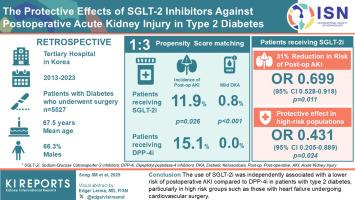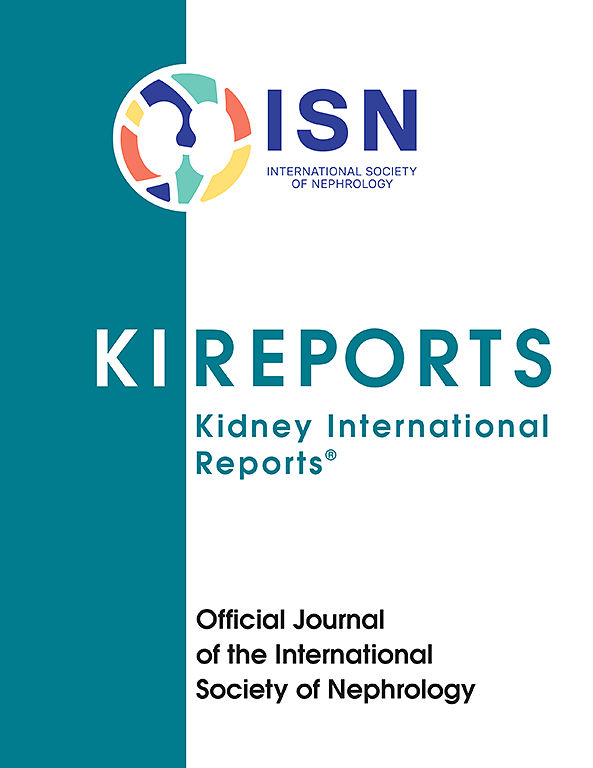The Protective Effects of SGLT-2 Inhibitors Against Postoperative Acute Kidney Injury in Type 2 Diabetes
IF 5.7
2区 医学
Q1 UROLOGY & NEPHROLOGY
引用次数: 0
Abstract
Introduction
Despite concerns about the potential of sodium-glucose cotransporter-2 inhibitors (SGLT-2i) to cause acute kidney injury (AKI), recent studies have shown that patients with diabetes on long-term SGLT-2i have lower rates of AKI-related hospitalizations and dialysis. We aimed to assess the real-world preventive effects of SGLT-2i on the risk of postoperative AKI.
Methods
We conducted a retrospective study on patients with diabetes who underwent a major surgery at a tertiary hospital in Korea from 2013 to 2023 (n = 5527). We compared patients receiving SGLT-2i with those receiving dipeptidyl peptidase-4 inhibitors (DPP-4i) before surgery to evaluate the development of AKI within 7 days after surgery. A 1:3 propensity score matching was performed to adjust for 10 potential confounders.
Results
Before matching, the mean age was 67.5 years, with males comprising 66.3% of the cohort. In the matched cohort, the incidence of postoperative AKI was 11.9% in patients on SGLT-2i and 15.1% in those on DPP-4i (P = 0.026). In a multivariable logistic regression analysis adjusted for various risk factors, the use of SGLT-2i was associated with a 31% reduction in the risk of postoperative AKI (odds ratio [OR]: 0.699; 95% confidence interval [CI]: 0.528–0.918; P = 0.011). Subgroup analyses demonstrated a significant protective effect of SGLT-2i in high-risk populations, particularly in patients with heart failure undergoing cardiovascular surgery, where the incidence of AKI increased to 54%, in which SGLT-2i reduced the risk of AKI by up to 57% (OR: 0.431; 95% CI: 0.205–0.889; P = 0.024). However, the SGLT-2i group experienced a higher incidence of mild diabetic ketoacidosis (DKA) than the DPP-4i group (0.8% vs. 0%; P < 0.001).
Conclusion
The use of SGLT-2i was independently associated with a lower risk of postoperative AKI than the use of DPP-4i in patients with type 2 diabetes, particularly in high-risk groups such as those with heart failure undergoing cardiovascular surgery. These findings suggest that SGLT-2i may have a role in perioperative AKI prevention in patients with diabetes, although careful monitoring for DKA is advised.

SGLT-2抑制剂对2型糖尿病术后急性肾损伤的保护作用
尽管人们担心钠-葡萄糖共转运蛋白-2抑制剂(SGLT-2i)可能导致急性肾损伤(AKI),但最近的研究表明,长期使用SGLT-2i的糖尿病患者与AKI相关的住院和透析率较低。我们的目的是评估SGLT-2i对术后AKI风险的实际预防作用。方法对2013年至2023年在韩国某三级医院接受大手术的糖尿病患者进行回顾性研究(n = 5527)。我们将术前接受SGLT-2i的患者与接受二肽基肽酶-4抑制剂(DPP-4i)的患者进行比较,以评估术后7天内AKI的发展情况。进行1:3倾向评分匹配,以调整10个潜在混杂因素。结果配对前平均年龄为67.5岁,男性占66.3%。在匹配的队列中,SGLT-2i组患者术后AKI发生率为11.9%,DPP-4i组为15.1% (P = 0.026)。在对各种危险因素进行校正的多变量logistic回归分析中,使用SGLT-2i与术后AKI风险降低31%相关(优势比[OR]: 0.699; 95%可信区间[CI]: 0.528-0.918; P = 0.011)。亚组分析显示,SGLT-2i在高危人群中具有显著的保护作用,特别是在接受心血管手术的心力衰竭患者中,其AKI发病率增加至54%,其中SGLT-2i可将AKI风险降低57% (OR: 0.431; 95% CI: 0.209 - 0.889; P = 0.024)。然而,SGLT-2i组的轻度糖尿病酮症酸中毒(DKA)发生率高于DPP-4i组(0.8% vs. 0%; P < 0.001)。结论在2型糖尿病患者中,SGLT-2i的使用与术后AKI的风险较DPP-4i的使用独立相关,特别是在高危人群中,如接受心血管手术的心力衰竭患者。这些发现表明SGLT-2i可能在糖尿病患者围手术期AKI预防中发挥作用,尽管建议仔细监测DKA。
本文章由计算机程序翻译,如有差异,请以英文原文为准。
求助全文
约1分钟内获得全文
求助全文
来源期刊

Kidney International Reports
Medicine-Nephrology
CiteScore
7.70
自引率
3.30%
发文量
1578
审稿时长
8 weeks
期刊介绍:
Kidney International Reports, an official journal of the International Society of Nephrology, is a peer-reviewed, open access journal devoted to the publication of leading research and developments related to kidney disease. With the primary aim of contributing to improved care of patients with kidney disease, the journal will publish original clinical and select translational articles and educational content related to the pathogenesis, evaluation and management of acute and chronic kidney disease, end stage renal disease (including transplantation), acid-base, fluid and electrolyte disturbances and hypertension. Of particular interest are submissions related to clinical trials, epidemiology, systematic reviews (including meta-analyses) and outcomes research. The journal will also provide a platform for wider dissemination of national and regional guidelines as well as consensus meeting reports.
 求助内容:
求助内容: 应助结果提醒方式:
应助结果提醒方式:


